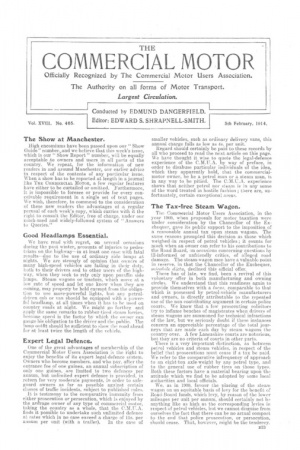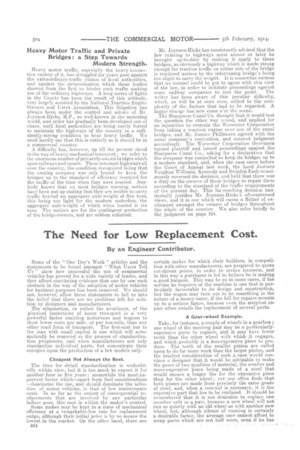The Show at Manchester.
Page 1

Page 2

If you've noticed an error in this article please click here to report it so we can fix it.
High encomiums have been passed upon our "Show Guide" number, and we believe that this week's issue, which is our "show Report" number, will be equally acceptable to owners and users in all parts of the country. We repeat, for the information of new readers in and around Manchester, our earlier advice in respect of the contents of any particular issue. When a show has to be reported at length in a journal like THE COMMERCIAL MOTOR, a few regular features have either to be curtailed or omitted. Furthermore, it is impossible to foresee or provide for every conceivable requirement in a single set of text pages. We wish, therefore, to commend to the consideration of these new readers the advantages of a regular perusal of each week's copy, which carries with it the right to consult the Editor, free of charge, under our much-used and widely-followed system of "Answers to Queries."
Good Headlamps Essential.
We have read with regret, on several occasions during the past winter, accounts of injuries to pedestrians on the highway—in at least one case with fatal results—duo to the use of ordinary side lamps at nights. We are strongly of opinion that owners of many high-speed vehicles are failing in their duty, both to their drivers and to other users of the highway, when they seek to rely only upon paraffin side lamps. Steam wagons or tractors, which move at a low rate of speed and let one know when they are coming, may properly be held exempt from the obligation to use more-powerful lights, but any petroldriven cab or van should be equipped with a powerful headlamp, at all times when it has to he used on country roads at night. We might. go further and apply the same remarks to rubber-tired steam lorries, because speed is. the factor by which the owner can gauge his obligation to the driver and the public. The lamp outfit should be sufficient to show the road ahead for at least twice the length of the vehicle.
Expert Legal Defence.
One of the great advantages of membership of the Commercial Motor Users Association is the right to enjoy the benefits of its expert legal-defence system. Owners who become members, and who pay, after the entrance fee -of one guinea, an annual -subscription of only one guinea, are limited to two defences per annum, but unlimited expert defence is provided, in return for very moderate payments, in order to safeguard owners as far as possible against certain classes of traffic incidents, subject to published rules.
It is testimony to the comparative immunity from either prosecution or persecution, which is enjoyed by the ova-rage owner of any type of -commercial motor, taking the country as a whole, that the C.M.TT.A. finds it possible to undertake -such unlimited defence at rates which in no. case exceed a charge, of us, per annum per unit (with a trailer). In the case of smaller vehicles, such as ordinary delivery vans, this annual charge falls as low as 4s. per unit.
Regard should certainly be paid to these records by all who proceed to read the next -article on this page. We have thought it wise to quote the legal-defence experience of the C.M.U.A. by way of preface, in order to disabuse particular individuals of the idea, which they apparently hold, -that the commercialmotor owner, be he a petrol man or a steam man, is in any way to be pitied. The C.M.U.A. experience -shows that neither petrol nor steam is in any sense of the word treated in hostile fashion ; there are, unfortunately, certain exceptional areas.
The Tax-free Steam Wagon.
The Commercial Motor Users Association, in the year 1900, when proposals for motor taxation were under consideration by the Chancellor of the Exchequer, gave its public support to the imposition of reasonable annual tax upon steam wagons. The same reasons prompted this decision as those which weighed in respect of petrol vehicles ; it counts for much when an owner can refer to his contributions to the Road Board, on occasions concerning questions by ill-informed or unfriendly critics, of alleged road damage. The steam-wagon men have a valuable point in reserve, in that the Chancellor of the Exchequer, mirabile dixtu, declined this official offer.
There has of late, we find, been a revival of this voluntary offer in both manufacturing and owning circles. We understand that this readiness again to provide themselves with a locus, comparable to that which is possessed by petrol-vehicle manufacturers and owners, is directly attributable to the repeated use of the non-contributing argunient in certain police courts, We know that a few prosecuting solicitors try to inflame benches of magistrates when drivers of steam wagons are summoned for technical infractions of the law, but we seriously doubt if these instances concern an -appreciable percentage of the total journeys that are made each day by steam wagons the country over. A few Lancashire courts are notorious, but they are no criteria of courts in other parts.
There is a very important distinction, as between petrol vehicles and steam Vehicles, in respect of the belief that prosecutions must cease if a tax be paid. We refer to the comparative infrequency of -approach to an eight-ton axle-weight by any petrol type, and to the general use of rubber tires on those types. Both these factors have a material bearing upon the attitude which we find to be adopted by some local authorities and local officials.
We, as in 1909, favour the placing of the steam wagon on an equitable basis of levy for the benefit of Road-Board funds, which levy, by reason of the lower mileages per unit per annum, should certainly not, be anything like as high as the corresponding levies in respect of petrol vehicles, but we cannot disguise from ourselves the fact that there can be no actual compact tothe end that police prosecution, or persecution, should cease. That, however, might be the tendency.
Heavy Motor Traffic and Private Bridges : a Step Towards • Modern Strength.
Heavy motor traffic, especially the heavy-locomotive variety of it, has struggled for years past against the extraordinary-traffic claims of local authorities, and against the determination which these bodies showed from the first to binder such traffic making use of the ordinary highways. A long series of fights in the Courts has been the result of this attitude, very largely assisted by the National Traction Engine Owners and Users Association. This litigation has always been under the control and advilie of Mr. Joynson-Hicks, M.P., so well-known in the motoring world, and order has gradually been developed out of chaos, until local authorities are being surely forced to maintain the highways of the country in a sufficiently-strong condition to bear heavy traffic. We need hardly say that this is entirely as it should be in a commercial country. A difficulty has, however, tip till the present stood in the way of heavy mechanical transport ; we refer to the enormous number of privately-owned bridges which span railways and canals. These intersect highways all over the country, the condition recognized being that the owning company was only bound to keep the bridges up to the standard of efficiency required for the traffic of the time when they were erected. Anybody knows that on most bridges warning notices have been put up stating that they are unable to carry traffic beyond an aggregate axle-weight of five tons, this being too light for the modern motorbus, the aggregate axle-weight of which when loaded is six tons. The notices are for the contingent protection of the bridge-owners, and are seldom enforced. Mr. Joynson-Hicks has consistently advised that the law relating to highways must sooner or later be brought up-to-date by making it apply to these bridges, as obviously a highway which is made strong enough for traction traffic on either side of the bridge is rendered useless by the intervening bridge's being too slight to carry the weight. It is somewhat curious that no counsel could be got to agree with this view of the law, in order to institute proceedings against some railway companies to test the point. The writer has been aware of this peculiar difficulty, which, as will be at once seen, added to the complexity of the factors that had to be regarded. A happy change has now come o'er the scene.
The Sharpness Canal Co. thought that it would test the question the other way round, and applied for an injunction to restrain the Worcester Corporation from taking a traction engine over one of the canal bridges, and Mr. Justice Phillimore agreed with the canal company's contention, and entered judgment accordingly. The Worcester Corporation thereupon turned plaintiff and issued proceedings against the Sharpness Canal Co., asking for a declaration that the company was compelled to keep its bridges up to a modern standard, and, when the case came before the Court of Appeal last week, the Lord Justices . Vaughan Williams, Kennedy and Swinfen Eady unanimously reversed the decision, and held that there was a duty on the owners of these bridges to repair them according to the standard of the traffic requirements of the present day. This far-re-aching decision incidentally justifies Mr. ,Toynson-Hicks's oft-expressed views, and it is one which will cause a flutter of excitement amongst the owners of bridges throughout the whole of the country. We also refer briefly to the judgment on page 524.


































